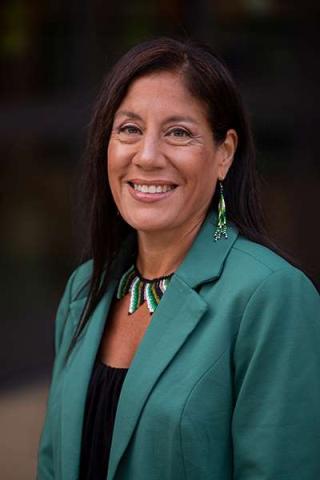
Meet Faculty Member Susan Branco, PhD

An advocate for increased adoption-related research and training within counselor education and improving mental health outcomes for transracially-adopted persons.
New Palo Alto University (PAU) faculty member Susan Branco, PhD, has a profound understanding of the mental health needs of adopted children, particularly those whose race or ethnicity is different than their adoptive parents. As a transracial adoptee from Bogotá, Colombia, South America, Dr. Branco was raised from infancy by supportive and caring white parents in a primarily homogenous community outside of Philadelphia. Susan discovered early on that people treated her differently. “Like someone of a different background even though they knew I was raised and lived with white parents, she said. “Because of this experience as I grew up it started me on a course of exploring different cultures.”
At George Washington University, she spent college spring breaks in Central America, improved her Spanish, and began majoring in Human Services and Rehabilitation Counseling. Her first site placement as an undergraduate student was teaching English and doing home visits with refugee families. This led her to the idea that she wanted to be a “helper.” She went on to work in community mental health, prenatal clinics, and with immigrant populations. In her early twenties, Dr. Branco began a long and frustrating search for her birth parents in Colombia, South America – a journey that concluded happily just three years ago when she was reunited with them thanks to the advent of DNA testing and programs like Ancestry.com.
By her late 20s, while pursuing a post-graduate training in Marriage and Family Therapy at Virginia Technical Institute, she became more involved with the adopted community. “I’d already been to Colombia several times and had thought a lot about what it means to be a transracial, transnational adoptee. You’re never done with that process, but I felt I was in a place where I could start working with families created through adoption,” Dr. Branco said. So, she opened her own counseling practice which coincided with the international adoption boom during the early 2000’s when the United States experienced the highest influx ever of internationally adopted children.
During this time, Dr. Branco discovered the widely held social misconception that internationally adopted children in the United States did not share the same unique mental health needs that children being adopted from the US foster care system have. “In fact, international and US foster care adoptees share very similar special needs,” she said. The key difference is that US foster children are eligible for government post-adoption services and are assigned case workers who follow-up to ensure the adopted child’s needs are being met. International and private adoptions are not privy to the same post-adoption support network, so there is a very big vacuum for this population. Most often, a transracially adopted child’s mental health needs are first identified by a school counselor. This led Dr. Branco to write her dissertation on the lived experiences of elementary school counselors working with transracially adopted students and their families.
Today, as an Associate Professor in the Counseling Department at PAU, Dr. Branco continues to advocate for increased adoption-related research, training within counselor education, and improved mental health outcomes for transracially-adopted persons. Two research strands she is most passionate about are: examining how adoptees come into consciousness - “A Model of Adoptee Awareness,” as she calls it, and the other being adoption policies in Colombia, South America. Dr. Branco discovered Colombia's adoption practices and policies allowed tens of thousands of illicitly adopted children. She has written an international book chapter on what reparations would look like in Colombia, comparing it to the reparation practices of Argentina and Chile. “I’m hoping to get some movement in the Colombian government, at least for them to acknowledge they’ve made some very bad mistakes,” Dr. Branco said.
As for the “Model of Adoptee Awareness,” Dr. Branco and her research colleagues, all of whom are transnational and transracial adoptees, are testing a consciousness model they’ve adapted from Latin American scholars and tailoring it for adoptees. Originally, they self-published their findings online, which is often frowned upon in higher education. “We did this because oftentimes people who are not in higher education cannot access a journal due to a paywall,” she said.
The research team’s hypothesis proved correct. “I can’t even count how many times the publication has been downloaded. So many people have commented on how this model resonates with them,” says Susan. The group discovered that many of the respondents view adoption as a social justice seeking endeavor. As they continued to analyze their findings, the paper was published this past summer in The International Body Psychotherapy Journal, special guest edited by another PAU faculty member, Karen Roller, PhD. They are hoping to present their model at the International Conference on Adoption Research (ICAR) at the University of Minnesota in 2024. Dr. Branco was recently invited to serve as a plenary speaker at ICAR to share her research findings and activism efforts during the final day of the conference.
When asked about other opportunities she sees in her new role at PAU, Dr. Branco is optimistic and enthusiastic. “Oh my goodness, what don’t I see? Everyone in the Counseling Department is extraordinarily receptive to my ideas. The faculty possesses such expertise and I know I can go to any of them and seek their support,” she said.
As for her newly discovered birth family in Bogotá, Colombia, Dr. Branco says she speaks to them almost every day. They reconnected during the pandemic, and while she couldn’t visit them right away, she has now visited them three times. “It’s a joy, I’m very fortunate. I will continue working towards ensuring the human right for all transracial and transnational adoptees to identify their birth parents.”
